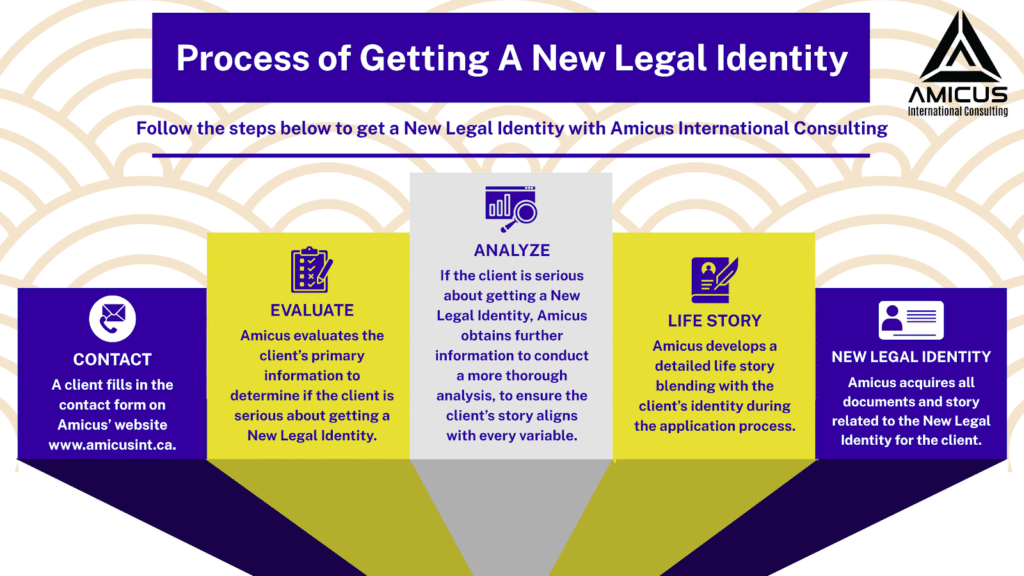VANCOUVER, British Columbia — In a world where digital records persist indefinitely and background checks are routinely weaponized to deny housing, employment, and even personal safety, the ability to erase a criminal history and rebuild legally has become more vital than ever. Contrary to the public misconception that criminal records are permanent marks, jurisdictions worldwide now offer legitimate legal avenues for record expungement, sealing, and identity restoration.
Amicus International Consulting, a leading authority on legal identity transformation and international privacy law, has released a comprehensive 2025 report detailing how individuals can lawfully clear their criminal pasts and build new, compliant identities with global acceptance.
This is not about escaping justice — it’s about completing rehabilitation. For thousands of individuals convicted of minor offences, unjustly targeted, or long since reformed, a single criminal mark can render them unemployable, vulnerable, and socially ostracized. Through proper legal processes, expert jurisdictional strategies, and ethical documentation alignment, it is possible to legally wipe the slate clean and start over — not in hiding, but in compliance with the rule of law.
Understanding the Problem: Digital Permanence Meets Legal Redemption
As digital background checks become standard for everything from job applications to dating, individuals with even minor infractions face lifelong exclusion. In many nations, even charges that never led to conviction remain visible in background databases, while media articles ensure perpetual public stigma. For many, especially those convicted of nonviolent or politically motivated offences, genuine reintegration is impossible without legal tools to erase the record and reestablish identity credibility.
Amicus International Consulting’s approach focuses on lawful, jurisdictional solutions that permanently expunge records, update civil registries, and reissue identification credentials — all within the bounds of domestic and international law.
Case Study: The Entrepreneur Haunted by a Decade-Old Offence
In 2010, a U.S. college student was arrested for possession of a controlled substance. Though the charge was dismissed, background checks continued to flag the arrest, damaging his career prospects for years. In 2023, Amicus assisted him in petitioning the state court for expungement. Simultaneously, he relocated to Panama, obtained permanent residency, and changed his legal name. His new identity — complete with a clean certificate of conduct and synchronized civil documents — allowed him to relaunch his professional life in Latin America, legally and successfully.
Step One: Determine Expungement or Sealing Eligibility
Not all criminal records are eligible for erasure, and eligibility varies dramatically by country and offence type. Amicus begins every case with a comprehensive audit of the client’s criminal record, including:
- Jurisdiction of conviction or charge
- Nature and classification of offence (misdemeanour vs. felony)
- Completion of sentence and rehabilitation period
- Any remaining probation, fines, or judicial supervision
- Impact of foreign charges on immigration status
Countries such as the United States, Canada, the United Kingdom, and Australia offer record expungement or sealing for certain offences. In the EU, the right to erasure under the GDPR provides additional support.
Step Two: Petition for Expungement, Sealing, or Pardon
Amicus coordinates legal representation in the jurisdiction of record to initiate formal petitions. Processes include:
- Filing motions for expungement in state or provincial courts
- Requesting record sealing from national databases
- Applying for gubernatorial or presidential pardons
- Requesting a certificate of rehabilitation
- Filing data deletion requests under privacy laws
In some cases, charges can be removed entirely from public databases, while in others, access is restricted to law enforcement only.
Case Study: The Nurse Who Cleared Her Name
A British nurse received a minor conviction for theft during a personal crisis. Although she served no jail time, the sentence appeared on every Disclosure and Barring Service (DBS) report, preventing her from obtaining employment. Amicus worked with UK-based legal partners to secure a “filtering” exclusion under updated DBS rules. Following a legal name change in Ireland, she resumed working in healthcare, fully licensed, with no public record linking her to her prior conviction.
Step Three: Identity Reformation Through Legal Name Change
Once a record is expunged or sealed, the individual may pursue a legal name change. This is crucial to ensure:
- Public disassociation from past legal records
- Prevention of algorithmic or biometric recognition across digital systems
- Eligibility for clean background checks and new identification documents
- Rebuilding of reputation, particularly in industries requiring licensing
Amicus guides clients through name change processes in over 40 countries, prioritizing jurisdictions with privacy protections and sealed name change procedures.
Step Four: Acquisition of Clean Documentation and Police Certificates
Expunged records must be reflected in official documents. Amicus helps clients secure:
- Clean police clearance certificates
- National ID reissuance under the new name
- New driver’s licenses, tax IDs, and social security numbers were permitted
- Passport issuance from countries that recognize the new identity and expunged history
This phase is critical for functional use of the new identity — from banking and travel to employment and housing.

Case Study: The IT Specialist Who Crossed Borders for a Clean Start
An Indian IT professional with a nonviolent protest-related conviction was denied visa renewals in multiple countries. After working with Amicus, he secured permanent residency in Georgia, obtained a court-supervised name change, and received a police clearance certificate that excluded expunged charges. Today, he works for a global tech firm remotely under his new identity, fully compliant and publicly unconnected to his past.
Step Five: Synchronization Across International Systems
International databases, such as Interpol’s I-24/7, Europol SIS, and the U.S. NCIC, often retain records even after domestic erasure. Amicus monitors and coordinates the removal of data from:
- Interpol red and blue notice systems
- Immigration databases (e.g., U.S. CBP, Canada’s IRCC)
- Bank compliance platforms (e.g., World-Check, LexisNexis, Thomson Reuters World-Check)
- Employment background check systems
- Visa alert systems and airline passenger name records
Where erasure is not possible, Amicus provides legal affidavits and official documentation explaining expungement for risk-based screening exemptions.
Step Six: Digital Footprint Erasure and Reputation Management
Legal erasure must be followed by digital cleansing. Even expunged records can be re-indexed through media, forums, or public watchdog sites. Amicus deploys:
- GDPR and CCPA-based takedown requests
- DMCA complaints for unauthorized publication of court records
- Court orders for search de-indexing
- Suppression of news articles via negotiation or legal action
- Online content creation strategies to overwrite prior mentions
The goal is to ensure that public searches under the new name return clean, consistent results — necessary for both reputation and safety.
Step Seven: Strategic Jurisdictional Relocation
In some cases, even a cleaned record can carry social stigma or regulatory challenges in the individual’s home country. Amicus assists clients in relocating to jurisdictions where:
- There is no reciprocity agreement with the country of original conviction
- Rehabilitated individuals are legally protected from discrimination
- Public access to criminal history is limited or prohibited
- Employers are barred from accessing sealed records
- Immigration law permits Naturalization despite past charges
Examples include Paraguay, Uruguay, parts of Eastern Europe, and several Caribbean nations. Amicus ensures legal compliance at every stage, including visa and Naturalization processing under the new identity.
Case Study: The Banker Who Reclaimed His Career
An Eastern European banker involved in a regulatory breach — although later cleared — found himself unemployable due to persistent negative news articles. He engaged Amicus to remove all mentions by data protection laws, changed his name legally in Montenegro, and resumed work in Dubai with a clean UAE certificate of conduct. The complete legal transition enabled him to reclaim his professional and personal reputation.
Expert Interview: The Law and Morality of Record Erasure
A legal advisor at Amicus International notes, “Expungement is not about pretending something didn’t happen — it’s about recognizing that the law gives people the right to move forward. When a court seals your record, it says society accepts your rehabilitation. We help make that recognition real and functional in the world.”
He adds, “What makes our work powerful is not just the deletion of data, but the reconstruction of a life. A clean record is just the start — we build everything that comes after.”
Global Trends Supporting Clean Record Initiatives
- Expanded expungement laws in U.S. states like Michigan, California, and Illinois
- EU-wide ‘Clean Slate’ data privacy reforms, including automated record sealing for minor offences
- AI-screening exemptions in visa systems for applicants with expunged records
- UN policy papers recommending pardons for politically motivated crimes in repressive regimes
- Growing public support for the reintegration of rehabilitated individuals into the workforce
How Amicus International Consulting Supports Record Erasure
-
- Legal audits to assess expungement eligibility
- Coordination with law firms to file court petitions
- Acquisition of police clearance and immigration certificates
- Financial onboarding with clean compliance profiles
- Reputational repair and digital footprint cleansing
- International relocation and long-term identity protection
Amicus only accepts clients with lawful intent, verifiable rehabilitation, and no ongoing criminal conduct. Clients seeking to obscure active legal obligations or violent offences are disqualified.
Conclusion: A Clean Record Is a Legal Right — A Clean Identity Is a Life Restored
Everyone deserves a chance to begin again — not as a fugitive, but as a person restored. For those who have paid their dues, proven their rehabilitation, and seek only a fair opportunity, the law offers tools to clear the slate. Amicus International Consulting exists to activate those tools — carefully, ethically, and expertly.
In a world that often forgets forgiveness, Amicus helps deliver what the law promises: not just freedom from punishment, but freedom to live.
Contact Information
Phone: +1 (604) 200-5402
Email: info@amicusint.ca
Website: www.amicusint.ca



